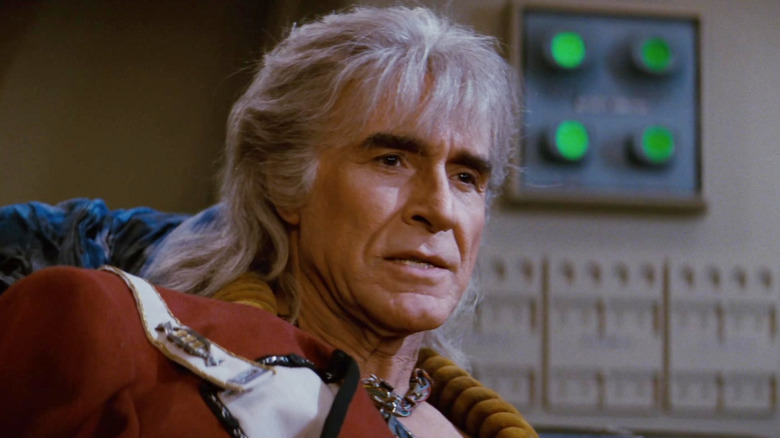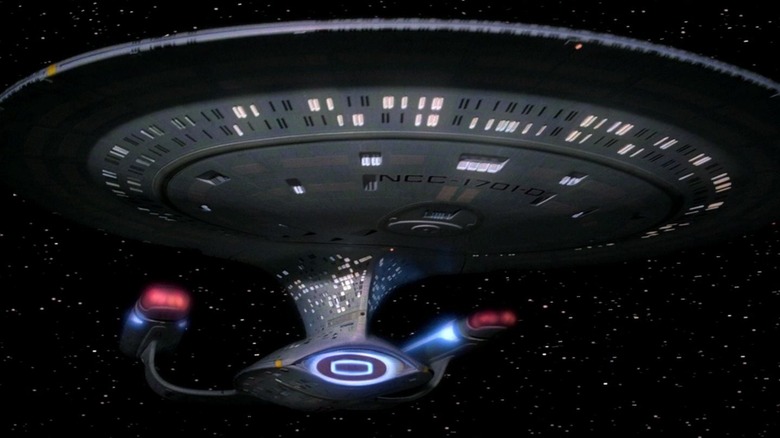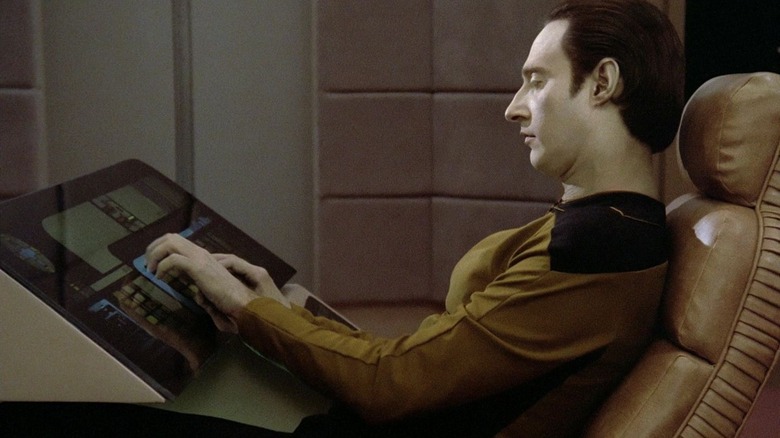Star Trek: The Next Generation Almost Brought Khan Noonien Singh Back With A Twist
When he first appeared in the "Star Trek" episode "Space Seed" (February 16, 1967), Khan Noonien Singh (Ricardo Montalbán) was merely a villain-of-the-week. Khan was a remnant of the long-ago Eugenics Wars, a conflict that broke out on Earth in the late 1990s, and which contributed to the near-destruction of the planet several decades later. Khan, genetically enhanced, managed to escape Earth in cryogenic stasis, only to be found and revived by the crew of the U.S.S. Enterprise nearly 200 years later. As one might predict, Khan, still thirsty for power, attempted to take over the Enterprise.
It wouldn't be until the release of Nicholas Meyer's "Star Trek II: The Wrath of Khan" in 1982 that the character would become mythic. Montalbán returned to play a Khan that was miffed after having been abandoned, and who goes on a mad quest to find and kill Admiral Kirk (William Shatner). In "Space Seed," Khan and his genetically enhanced brethren were dropped off on an uninhabited planet, invited to build their own masterpiece society. A solar cataclysm, however, swiftly transformed the planet into a desert wasteland, and Khan was left high and dry. Enraged at Kirk for not checking in on him, Khan hijacks a ship and aims to ruin Kirk's life.
By the end of "Khan," however, the villain's scheme is foiled, and he is hoisted by his own petard. Khan was most certainly dead, following the activation of the planet-terraforming Genesis Wave.
It seems, though, that Khan was once slated to return from the grave for an episode of "Star Trek: The Next Generation." Writer and producer Marc Bernardin ("Castle Rock," "Star Trek: Picard") worked as an intern on "Star Trek: Deep Space Nine" early in his career, and he recalled seeing a NextGen spec script called "Past Present" passing its way through the Paramount offices. The script featured Khan as the episode's central antagonist. Bernardin described the script in an interview with Vulture in 2017.
'Past Present'
Thanks to fantastical warp drive technologies, the ships on "Star Trek" are merrily able to sail from star to star without too many delays. If there are delays, they either happen in between episodes, or during time-saving edits. Bernardin recalls "Past Present" taking place during one of those delays. Most ships in the "Next Generation" era are capable of traveling at warp-9, which is about 1,516 times the speed of light.
But space is unbearably vast, and even with the fictional technology, it still takes a long time to visit other planets. To go from Earth just to Alpha Proxima (the closest star, about 4.4 lightyears away) would still take the Enterprise-D about 25 hours, traveling at Warp-9.
Bernardin said that "Past Present" was going to address those long bouts of downtime on the Enterprise. "'Star Trek' always pretended that space was a crowded place," Bernardin said, "when in reality, even with warp capabilities, the distance between populated systems is impossibly vast." Captain Picard (Patrick Stewart) would become concerned that his crew might become complacent during those spans. To quote: "Picard was concerned about the crew's level of preparation. Even though the Enterprise wasn't a warship, a knife still needs to be kept sharp."
Then, during one of these dull, long starship rides, Khan was to attack out of nowhere. Bernardin continued:
"Picard vented his frustration to Data, who can't share his concern, as circuits don't get dull from lack of use. Later, there's an attack on the Enterprise, from seemingly out of nowhere. It cripples the ship. The culprit: Khan Noonien Singh. Somehow, delivered from the clutches of the Genesis device (which does, after all, create life out of lifelessness) and pitted against a new generation of Starfleet captain."
Trekkies saw how Kirk faced off against Khan. Now it was time to see how Picard might fare.
The twist ending
The Genesis Wave, to remind readers, was a terraforming device that, when fired at an uninhabited planet, would completely re-work the molecules on its surface and transform it into a verdant, planet-wide biome almost instantly. At the end of "Star Trek II," Khan fired the Genesis device, and unwittingly created a new planet out of the particles in a nebula. In the sequel, "Star Trek III: The Search for Spock," it would be revealed that the Genesis Wave also managed to grow, essentially, a clone of the deceased Spock (Leonard Nimoy).
It seems that for "Past Present," the Genesis Wave would have done something similar for Khan. He would explode in the vacuum of space in "Star Trek II," but the Genesis Wave would reconstitute his cells, or some such thing. Sadly, Bernardin doesn't quite recall all the details of Khan's return. He does recall, however, the twist ending. In what might be considered a cop-out, Khan would not be real. Bernardin said:
"I don't remember the ins-and-outs of the plot, but the upshot was that Data took Picard's musings as an order and created a simulation that would challenge the entire crew. With a little holodeck trickery and inertial dampener manipulation, Data turned the Enterprise into a big-ass motion simulator ride."
So Montalbán would have returned, but Khan, not so much. It was all going to be a holodeck simulation. That's not a very satisfying addition to "Star Trek" lore. On a very visceral level, however, some Trekkie might have found it very exciting to see Picard and Khan meet face-to-face.
"Past Present" was just a spec script, and was never even put into pre-production, so it's likely Montalbán was never called, and the "NextGen" cast never saw it. It's just one of those fun speculative stories that Trekkies love to muse over.


